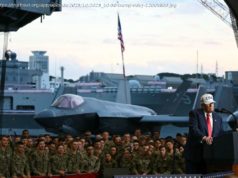LINDA CHAVEZ: What happened to Otto Warmbier happens every day in North Korea. In the camps, starvation, torture and physical labor kill prisoners.
Otto Warmbier’s death is one of hundreds of thousands at the hands of the most brutal regime in the world: North Korea’s. The American student went to North Korea on a tour in 2016 and did something foolish. He tried to steal a propaganda poster from the wall of his hotel, an act captured on surveillance cameras.
For his “crime, ” the North Koreans sentenced him to 15 years of hard labor. The scene of his tearful confession in his sham trial is the last picture we have of Warmbier alive. We will probably never know exactly what happened to him, but we do know that the healthy young man lapsed into a coma shortly after his trial and that his brain slowly died. By the time the North Koreans shipped him home, his brain was so damaged he would never recover, and he died within days.
But what happened to Warmbier happens every day in North Korea. The cameras that captured him ripping a penny poster from a wall are everywhere, as are government loudspeakers in every apartment, house and building, part of a surveillance and communication system intended to keep tabs on every one of North Korea’s 25 million people. For “crimes” as innocent as commenting on the health of any member of the Kim dynasty, which has ruled the country for almost 70 years, one can end up in a political prison camp. Once in the camp, starvation rations, torture and brutal physical labor — as much as 16 hours a day — quickly kill off most prisoners.
Because the prison camps provide slave labor to the regime, there is constant pressure to keep them filled — and not just with those the regime has actually accused of crimes. Whole families end up in the North Korean gulag under a 1972 dictum by the country’s founder, Kim Il Sung: “Factionalists, or enemies of class, whoever they are, their seed must be eliminated through three generations.” The state punishes not just the person accused but also his parents and children. Few emerge to tell their stories, and fewer still escape North Korea, but vivid accounts of those who have spent time in the secret camps have been published, most notably “The Aquariums of Pyongyang: Ten Years in the North Korean Gulag, ” by Kang Chol-hwan.
Unfortunately, these stories don’ t seem to capture the American mind. We look away rather than deal with the implications that a poor, small country halfway around the world is imprisoning its citizens, starving them, torturing them and killing them year in and year out. As we saw with the stories that emerged of the Holocaust, the Cambodian killing fields and the Rwandan genocide, we would rather not see what is happening until forced to look, and by then, it’s too late. When one of our own ends up murdered, we pay attention — for a while.
Three additional American citizens remain held in North Korea: a businessman, whom the regime sentenced to 10 years of hard labor shortly before Warmbier’s trial, and two teachers, who were teaching through a North Korean government-approved program at Pyongyang University of Science and Technology and who have not yet been tried. In all, 16 American citizens have been arrested in North Korea in the past 10 years and released only after high-profile intervention by former U. S. presidents or their envoys. We have no diplomatic ties with North Korea and must, for the most part, depend on the Swedish Embassy to protect our interests.
Meanwhile, Kim Jong Un — the country’s “precious leader, ” as he is often addressed — continues to threaten nuclear annihilation, trying to build long-range missiles capable of carrying a nuclear warhead to America’s shores. He already has nuclear bombs, which he continues to test despite threats from the United States and the international community. And we do nothing but sit and wait — or, in President Donald Trump’s case, beg the Chinese to intervene with their client.
There may be no good options in dealing with North Korea; we have nearly 30,000 American troops stationed just miles away from the Demilitarized Zone, and millions of South Koreans could be killed in an attack. But the worst option is to do nothing. Does anyone really believe that ignoring Kim makes the world safer?
Otto Warmbier certainly did not deserve to die, but neither did the millions of North Koreans who have been starved or worked to death in 69 years of brutal repression by their communist government. If we cannot stop Kim Jong Un, how do we call ourselves a superpower?






